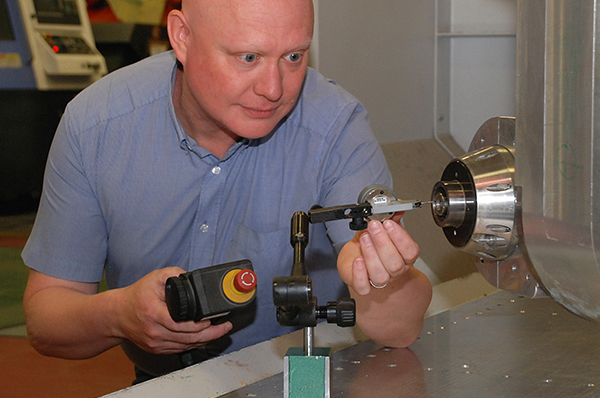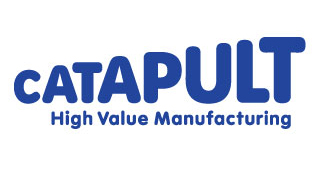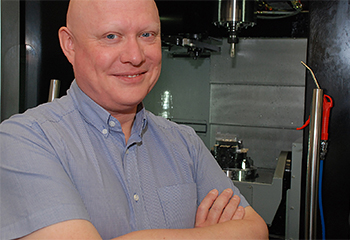Machine tool accuracy to rise to new level
 Dr Andrew Longstaff (pictured above) has earned the opportunity to work at one of the world’s most advanced facilities as part of a High Value Manufacturing Catapult Fellowship.
Dr Andrew Longstaff (pictured above) has earned the opportunity to work at one of the world’s most advanced facilities as part of a High Value Manufacturing Catapult Fellowship.
Thu, 11 Jun 2015 12:31:00 BST
Dr Andrew Longstaff has received an EPSRC High Value Manufacturing Catapult Fellowship to bring commercial reality to cutting-edge research
 THE University of Huddersfield’s Dr Andrew Longstaff is carrying out research that aims to bring about significant improvements in the accuracy of machine tools. Now he has earned the opportunity to work at one of the world’s most advanced facilities and it could provide a fast track that ensures his developments are adopted more speedily by major manufacturers.
THE University of Huddersfield’s Dr Andrew Longstaff is carrying out research that aims to bring about significant improvements in the accuracy of machine tools. Now he has earned the opportunity to work at one of the world’s most advanced facilities and it could provide a fast track that ensures his developments are adopted more speedily by major manufacturers.
Dr Longstaff is a Principal Enterprise Fellow at the University’s EPSRC Centre for Innovative Manufacturing in Advanced Metrology. Now he has received a Fellowship to work with the High Value Manufacturing Catapult (HVMC), which is part-funded by Innovate UK. The scheme is funded by the Engineering and Physical Sciences Research Council and is designed to help academics to work with industry-focused centres to turn their research into commercial reality. Catapults are described as “the catalyst for the future growth and success of manufacturing in the UK”.
His HMVC Fellowship will see Dr Longstaff working at the University of Sheffield Advanced Manufacturing Research Centre with Boeing (AMRC). Based near Rotherham, the AMRC is a world-class centre for collaborative research that researches and resolves advanced manufacturing problems on behalf of its large roster of industrial partners, who include global aerospace giants such as Rolls-Royce and BAE Systems alongside ambitious regional companies.
 Over the next four years, under the terms of his Fellowship, Dr Longstaff will spend the equivalent of six months at the AMRC. He will take with him the novel, advanced strategies he has developed for quantifying machine tool accuracy and improving the predictability of manufactured components.
Over the next four years, under the terms of his Fellowship, Dr Longstaff will spend the equivalent of six months at the AMRC. He will take with him the novel, advanced strategies he has developed for quantifying machine tool accuracy and improving the predictability of manufactured components.
He will carry out trials at the AMRC and his techniques can then be passed to the companies that are members of the Centre.
“It is a question of taking something that had been developed in a research environment and then getting it out more widely,” said Dr Longstaff. As a result, improved levels of machine tool accuracy would be spread through the manufacturing supply chain, he added. This could see a step-change in the value and productivity of UK manufacturing.
In addition to the knowledge transfer element of the Catapult Fellowship, there is also an important research dimension.
“We will be getting controlled manufacturing data and correlating machine accuracy with the final output of the work piece,” said Dr Longstaff. “If you try to do this in industry directly you sometimes struggle to obtain the controlled data to make that correlation, but in the more controlled environment of the AMRC we have a better chance of making sure that we can establish that cause and effect.”
Dr Longstaff also hopes that this EPSRC HMVC Fellowship will act as the spur for new projects and collaborations. He is one of two senior researchers at the University of Huddersfield’s EPSRC Centre who have been awarded Catapult Fellowships. The other is Dr Feng Gao, who will work with the Centre for Process Innovation (CPI), based in County Durham.







